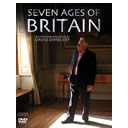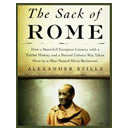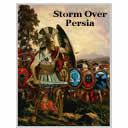Seven Ages of Britain
 Seven Ages of Britain is a BBC television documentary series which is written and presented by David Dimbleby.
Seven Ages of Britain is a BBC television documentary series which is written and presented by David Dimbleby.
The series covers the history of Britain's greatest art and artifacts over the past 2000 years. Each episode covers a different period in British history.
1. Age of Conquest. The first part of the chronicle begins with the Roman invasion and ends with the Norman Conquest. David travels throughout Britain in search of the greatest works of art from the time: the mosaics of Bignor Roman Villa, the burial treasure of Sutton Hoo, Anglo-Saxon poetry and Alfred the Great's Jewel.
2. Age of Worship. The story of British art in the Middle Ages, spanning from the murder of Thomas Becket in 1170 to the death of Richard II in 1400. It was an age defined by worship - whether worship of God, the king, or one's lady love.
3. Age of Power. This episode looks at the Tudors and spans from Henry VIII's accession in 1509 to the first performance of Shakespeare's Henry VIII exactly 100 years later.
4. Age of Revolution. In the 17th century, when the people of Britain learned to question everything. The result was the Civil War, in which everyone, including artists, had to take sides. Out of it came a reinvented monarchy, a scientific revolution and, ultimately, the great Cathedral of St Paul's.
5. Age of Money. In the 18th century, the triumph of commerce led to the emergence of a new 'middle' class, a group of people who craved pleasure and novelty, and developed its own tastes in art. The result was a golden age in painting, with Hogarth, Reynolds and Gainsborough reinventing the British style.
6. Age of Empire. The story of the British Empire from 1750 to 1900, revealed through its art and treasures. David Dimbleby travels through Britain, America and India, tracing the descent from adventure and inspiration into moral bankruptcy as the Empire became a self-serving bureaucratic machine.
7. Age of Ambition. In the last episode, David Dimbleby looks at how the 20th century saw ordinary Britons upturning ancient power structures and class hierarchies. The catalyst was the First World War, which embroiled the whole nation and called traditional values into question.




Not a single mention of the American Revolution, as if it never happened and had no effects on British culture.
In the 17th century, when the people of Britain learned to question everything.
HAHA... This sentence alone instantly discredits the entire documentary.
Cool documentary, but biased because it's made by the ultra extreme right-wing pro-British network the BBC.
All episodes are gripping. I am neither English, Irish, Scottish or Welsh. I am amused by some of the petty comments here. Even though I generally keep up with the world affairs with high degree off passion, there were so many fascinating things here that I am recommending this strongly to my good friends.
Quote: 'As per usual from the EBC,(English Broadcasting Corporation),for British read English and vice versa! Very little to do with Scotland,Wales or Northern Ireland!'
Ah, but, England constitutes about 85% of the total UK population.
As per usual from the EBC,(English Broadcasting Corporation),for British read English and vice versa! Very little to do with Scotland,Wales or Northern Ireland!
There sure is a lot of junk, in my opinion. But, I think the good stuff is still happening; it just doesn't make it onto a show that is probably just trying to show how radical and different some modern-day "works" are, compared to times gone by.
The "art" of the seventh age is inane, asinine, and reveals the depths to which this great society has fallen. The 8th age will surely be the Age of Nihilism. It's the natural outcome of Socialism on society and therefore the arts.
Woe Britainna!
I think with the amount of time he had here, it was done quite well. I was kind of blown away in the last hour. What a contrast from corsets and proper upturned noses. I love looking at all that treasure, but realize it was stolen from all over the world, and probably thousands of deaths are tied to that chest full. I'm speechless.
well for what its worth i thoroughly enjoyed this series.
to all detractors though... ummmm errrrr there's no such thing as a perfect universe so ..... so what if there are some inaccuracies in the interpretations of histories moments that haven't had a modern day camera from every angle to capture the moments in their entirety. so, i doubt very much that there will ever be a 100% accurate interpretation.
we all have enough intelligence to watch and enjoy this for what it is with all its shortcomings and necessarily personal interpretations. you are permitted to interpret differently if you so choose.
enjoy
cheers
daniel, as a matter of fact, I'm enjoying it, too.
silktop you are an ass. Whats wrong with showing the history of a nation through it's art, i enjoyed the series, Fish in Vermont liked it. over!
I've always wondered about those gloves. Just watched Inside the Medieval Mind with Robert Barrett and he's flipping through a one-of-a-kind scribed parchment manuscript with bare hands like it's a telephone book. Yet, in other programs, it seems every effort is made to strictly keep the skin oils off the book's pages. The criteria varies, apparently, from object to object, book to book, museum to museum.
gero2006, yes, now creep back to your scholarly hole and let us enjoy the grandpa playing with golden trinkets.
This is a BBC/Open University collaboration. The aim of the series seems to be to get viewers to consider signing up for an Open University degree.
For people outside UK, the Open University (OU) provides degree courses for those don't want or can't afford to study at normal universities. Traditionally, these were people who dropped out of school in adolescence but wanted a second chance in adulthood. To help these people, who often had low incomes reflecting their lack of qualifications, the OU offered means-tested grants so people with low incomes could study free. However, these days the OU student is often a mature person with qualifications and work experience seeking a career change rather than someone without basic education. Such people pay their own costs and expect courses which are pitched at a higher level of academic ability and knowledge. The OU is an institution in transition trying to serve both groups despite the fact they have very different needs. As a consequence the OU is maybe not serving either set of students as well as they'd like and deserve. I've never done an OU course but I have colleagues and friends who have and that's the basis for my remarks. I think it is useful to have this context if one wants to understand this series.
Now back to the series - it is full of fascinating tidbits of random information and contentious claims e.g. about history or art criticism which you will want to research further if only to contradict what the presenter, David Dimbleby, says on screen. The early episodes are the least well informed and the first two episodes sketchily skimming over thousands of years of culture in the British Isles before the Tudor period are simply ridiculous. The material is handled better in the last two episodes where Dimbleby seems to be much more at home with his material. They should have focused on this period and left the earlier material alone (or had someone better qualified present the earlier episodes). I imagine the purpose of the tidbits and provocative claims is as inducements to get the viewer to consider signing up for an Open University degree so they can learn more or have their say on the issues raised. The presenter often engages in 'vox pop' interviews with 'ordinary people'. This, presumably, is to demonstrate to viewers that 'ordinary people' can study this subject so the viewer should feel emboldened to do so too. Given the assumption that the programme makers know more than the 'ordinary' viewer, the target audience for this series seems to be the 'dropped out of school' potential OU student rather than the mature person seeking a second degree or career change. I suppose whether you enjoy this series or not depends on whether you match that target audience.
Despite all its failings, the series remains enjoyable as eye candy and Dimbleby is a charming presenter. It also has unintentionally funny moments. My personal favourite is the pompous ritual of putting on white gloves to handle the 'holy relics' of British heritage which occurs at least once each episode (especially in the earlier episodes when Dimbleby is totally out of his depth - psychoanalyse that as you wish).
Thanks to this doc I finally know where the helmet on loading screen of the ZX Spectrum game Valhalla comes from.
Great surrogate for sleeping pills!
a cock syringe? thats something you wont see everyday
I have seen this series and I can tell you, this is a good one. What makes it truly unique is that the presenter gets up close to some British national treasures and gives us a view of them that only a privilaged few would ever get. For this reason alone, I recommend it. But, in addition, it is well-produced across the board, and holds your attention throughout with great little details that makes certain times and places seem very close and very real. This is one of those documentary series that can be watched many times.
A brilliant doc on the history of all things British. Very long and at times a bit slow, but if you love history then its one of the best. Britian has a very odd and intersting history in many ways, what had always thought of as British turns out to be based on Norman culture. If you are a history fan this one lands a solid eight, if not it may bore you to death.